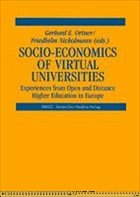Inspired by the presentations and keynote addresses during the EADTU/FernUniversität workshop on University Level Distance Education in Europe (Hagen/Germany, December 1994) a small working group on the socio-economic impact of distance education systems was installed by the European Association of Distance Teaching Universities.
It is thanks to the subsidy received from the SOCRATES/ODL Programme of the European Commission that the research activities and the joint reflection by experts from key instituions in Higher Distance Education could be executed on six main socio-economic issues of the Virtual University, namely Political Issues, Socio-Economic Effects, Distance Teaching Market, Consumers' Satisfaction, Economic Efficiency, and Efficiency of New Technologies, and presented in this publication. The publication is menat to meet the interest of the public from the two areas: the already experienced Open Distance Learning institutions to improve and better perform their activities, and those institutions who are considering using Open Distance Learning methods and technigues to develop their suite of programmes and satisfy potential demand in their areas of operation. In particular policy makers and practitioners will be able to better assess and validate their plans in the Higher Distance Education area against socio-economic criteria, benefit from the real experiences from the past and present and the projections into the future, and improve the quality of their University Level Distance Education activities and the development of the Virtual University.
It is thanks to the subsidy received from the SOCRATES/ODL Programme of the European Commission that the research activities and the joint reflection by experts from key instituions in Higher Distance Education could be executed on six main socio-economic issues of the Virtual University, namely Political Issues, Socio-Economic Effects, Distance Teaching Market, Consumers' Satisfaction, Economic Efficiency, and Efficiency of New Technologies, and presented in this publication. The publication is menat to meet the interest of the public from the two areas: the already experienced Open Distance Learning institutions to improve and better perform their activities, and those institutions who are considering using Open Distance Learning methods and technigues to develop their suite of programmes and satisfy potential demand in their areas of operation. In particular policy makers and practitioners will be able to better assess and validate their plans in the Higher Distance Education area against socio-economic criteria, benefit from the real experiences from the past and present and the projections into the future, and improve the quality of their University Level Distance Education activities and the development of the Virtual University.

